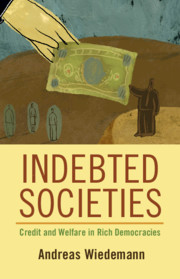Crossref Citations
This Book has been
cited by the following publications. This list is generated based on data provided by Crossref.
Hacker, Jacob S.
Hertel-Fernandez, Alexander
Pierson, Paul
and
Thelen, Kathleen
2021.
The American Political Economy.
2021.
When People Want Punishment.
p.
258.
Thelen, Kathleen
and
Wiedemann, Andreas
2021.
Who Gets What?.
p.
281.
2022.
Resisting Extortion.
p.
248.
Wherry, Frederick F.
and
Chakrabarti, Parijat
2022.
Accounting for Credit.
Annual Review of Sociology,
Vol. 48,
Issue. 1,
p.
131.
2022.
Big Data and the Welfare State.
p.
233.
Iversen, Torben
and
Rehm, Philipp
2022.
Information and Financialization: Credit Markets as a New Source of Inequality.
Comparative Political Studies,
Vol. 55,
Issue. 14,
p.
2349.
Hacker, Jacob S.
Hertel-Fernandez, Alexander
Pierson, Paul
and
Thelen, Kathleen
2022.
The American Political Economy: Markets, Power, and the Meta Politics of US Economic Governance.
Annual Review of Political Science,
Vol. 25,
Issue. 1,
p.
197.
Wiedemann, Andreas
2023.
A Social Policy Theory of Everyday Borrowing: On the Role of Welfare States and Credit Regimes.
American Journal of Political Science,
Vol. 67,
Issue. 2,
p.
324.
Mulcahy, Niamh
2023.
The aleatory moment of finance and the structural production of class-based inequality.
Distinktion: Journal of Social Theory,
p.
1.
Lindh, Arvid
and
McCall, Leslie
2023.
Bringing the market in: an expanded framework for understanding popular responses to economic inequality.
Socio-Economic Review,
Vol. 21,
Issue. 2,
p.
1035.
Ducourant, Hélène
and
Lazarus, Jeanne
2023.
Credit in Society and in Sociology: On “The Bank and Its Customers” (Bourdieu, Boltanski, Chamboredon, 1963).
European Journal of Sociology,
Vol. 64,
Issue. 3,
p.
385.
Bea, Megan Doherty
Amorim, Mariana
and
Friedline, Terri
2023.
Public Cash Assistance and Spatial Predation: How State Cash-Transfer Environments Shape Payday Lender Geography.
Social Service Review,
Vol. 97,
Issue. 3,
p.
498.
Jensen, Amalie Sofie
and
Wiedemann, Andreas
2023.
Cross-National Support for the Welfare State Under Wealth Inequality.
Comparative Political Studies,
Vol. 56,
Issue. 13,
p.
1959.
Kholodilin, Konstantin A.
Kohl, Sebastian
Korzhenevych, Artem
and
Pfeiffer, Linus
2023.
The hidden homeownership welfare state: an international long-term perspective on the tax treatment of homeowners.
Journal of Public Policy,
Vol. 43,
Issue. 1,
p.
86.
SoRelle, Mallory E.
and
Laws, Serena
2024.
Deservingness and the Politics of Student Debt Relief.
Perspectives on Politics,
Vol. 22,
Issue. 2,
p.
372.
Markgraf, Jonas
and
Rosas, Guillermo
2024.
Borrowing to Self-Insure? Credit Access and Support for Welfare.
The Journal of Politics,
Vol. 86,
Issue. 2,
p.
642.
Mulcahy, Niamh
2024.
Investing in the community: English local authorities and the ‘patient investment’ of economic regeneration.
Journal of Cultural Economy,
Vol. 17,
Issue. 5,
p.
588.
Frank, Nicholas
Arthur, Megan
and
Friel, Sharon
2024.
Shaping planetary health inequities: the political economy of the Australian growth model.
New Political Economy,
Vol. 29,
Issue. 2,
p.
273.
Wiedemann, Andreas
2024.
The Electoral Consequences of Household Indebtedness under Austerity.
American Journal of Political Science,
Vol. 68,
Issue. 2,
p.
354.



